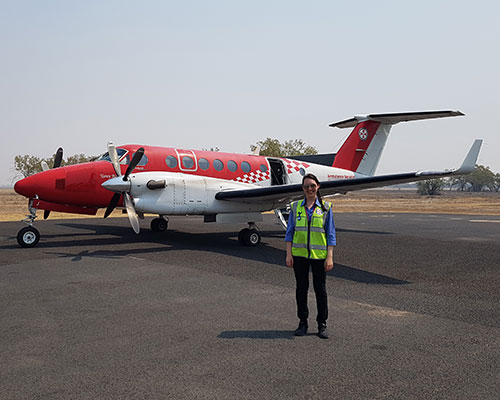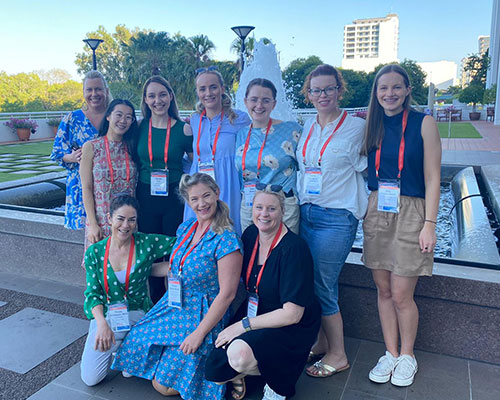Featured image: Nasiba Faiz MACN as part of the ‘A Day in the Life of as WSLHD NICU nurse’ for 2022 National Nurses Day. Source: Supplied via Youtube
When you have had a long day at work, having a network of nurses who can share your experiences, help navigate new state or region-based policy, or lend an ear if you need a chat can be a lifeline.
The Australian College of Nursing (ACN) wants every nurse to feel safe and supported with a community of like-minded colleagues and friends. A part of this commitment are ACN’s Regions, where nurses from similar geographic locations across Australia convene to support each other, share their insights, and hold events to further develop the profession.
To kick start 2023, the Sydney Region has developed a newsletter special to the Region and its activities, including a sessional profile of a nurse from Sydney to show the breadth of expertise, experience and skill of the region.
Sydney Region Communications Coordinator Paige Isley MACN launched the campaign with an interview with Stage Four Emerging Nurse Leader Nasiba Faiz MACN, discussing nursing from the first breath of life to nursing in the skies.
Tell us your story; how did you choose nursing as a profession, and what inspired you to participate in the ENL program?
My career in healthcare started with a medical science degree from the University of Sydney. In my final year, I was fortunate enough to participate in a day tour of the Neonatal Intensive Care Unit (NICU) at Royal Prince Alfred (RPA) Hospital as part of my development science class. Upon entering the dimly lit NICU, my attention was immediately drawn to the tiny babies in incubators and the skilled nurses providing their care. I was captivated by the nurses’ expertise as they taught us about the fetal to neonatal transition. Their exceptional skill and ability to administer direct patient care left an indelible impression on me, fueling my passion for nursing and prompting me to pursue a nursing degree at the same university upon graduation.
Throughout my nursing program, I was privileged to partake in various extracurricular activities, including serving as a student ambassador, vice president of the nursing society, and participating in the Summer Research Scholar program, as well as a special placement with the NSW Air Ambulance. I also had the honor of attending the National Nursing Forum (NNF) as a student delegate, where I was introduced to ACN and intrigued by the potential for professional development and career advancement through the mentorship opportunities.
After graduating, I completed the new graduate program at Westmead Hospital, where I rotated through various areas, including adults and NICU. Following my rotations, I spent two years working in the NICU. Seeking to expand my horizons and take on new challenges, I decided to join the pediatric intensive care unit at The Children’s Hospital Westmead, where I have been continuing to learn and grow.
Eventually, I made the decision to apply for stage 3 of the program and was thrilled to have completed it as a high achiever last year. Currently, I am enrolled in stage 4 and eagerly looking forward to the exciting opportunities for both personal and professional growth that lie ahead.

Nasiba’s placement with NSW Air Ambulance. Source: Supplied
As a NICU nurse, you had a critical role in the care of premature and critically ill newborns. Can you tell us about a particularly memorable case you have helped manage in the NICU, and what it’s like to care for such tiny humans?
Caring for newborns was a deeply humbling experience for me. The first time I had the opportunity to care for a premature neonate, I was struck by a range of emotions – awe at the amazing technology and medical advancements that have improved outcomes dramatically, admiration for the incredible expertise and dedication of the teams who care for them, and empathy for the parents who have a long and challenging journey ahead. I have gained valuable insights into the importance of early detection and intervention in cases of deterioration, and have witnessed the transformation of fragile newborns into healthy infants ready to be discharged.
One particular case that stands out when I was early in my NICU career, was when I had the opportunity to assist the Access Nurse in transferring a newborn with antenatally diagnosed Transposition of the Great Arteries who required urgent surgery. I attended the C-section and witnessed the incredible teamwork between the nurses, midwives, and doctors as they worked together seamlessly to ensure a smooth transfer. While to them it may have been a routine procedure, for me it was a powerful reminder of the life-saving work being done every day.
I consider myself extremely fortunate to have received tremendous support from my educators and colleagues, who have played a pivotal role in facilitating my growth and development within the NICU. I had the opportunity to care for a diverse range of infants, from full-term babies requiring treatment for hypoglycemia and sepsis, to premature babies requiring specialized respiratory support.
Through my experience, I gained invaluable insights into the realm of neurodevelopmental care, family education, and the critical importance of a multidisciplinary team approach to address the child’s care holistically. These experiences have been instrumental in shaping my perspective and approach to patient care and have helped me hone my skills in providing comprehensive and compassionate care to all those under my purview. They have also been pivotal in facilitating my smooth transition to the Paediatric ICU, and for that, I am immensely grateful to have had such enriching experiences.
In your opinion, what are some of the biggest challenges facing the nursing profession today, and how do you think we can address them?
As a nurse, I recognize that burnout and compassion fatigue are significant challenges that can lead to retention issues in our profession, particularly for early-career nurses who lack protective factors or mentorship. As someone who has personally experienced burnout and compassion fatigue, I empathize with those who feel overwhelmed and stuck. That’s why I prioritize discussing this issue with my ENL cohort and ACN, in an effort to prevent it from happening to others.
Clinical supervision and mentorship are critical in helping nurses develop better strategies for work situations and providing a safe space for debriefing. Creating a culture of inclusivity and safety is another solution to promote a positive workplace environment. As a Culture Ambassador at my workplace, I promoted open communication and provided resources for staff to address any concerns. By fostering a positive and inclusive workplace culture, we can help nurses thrive and provide excellent patient care.
As a leader in nursing, what do you think are essential leadership qualities?
Certainly, being a leader requires a unique set of qualities that enable individuals to effectively lead and inspire others towards a common goal. As a leader, it is important to possess qualities such as effective communication skills, the ability to make tough decisions, taking responsibility for the outcomes of those decisions, and learning from mistakes. These qualities enable a leader to set clear goals and objectives, and inspire others to work towards achieving them.
However, being a leader also means building trust and respect with your team, creating a positive work environment, and being a good role model for others. It requires empathy and the ability to understand the needs and concerns of others and providing support and guidance when needed. As a leader, it is important to lead by example and serve as a role model for your team.
The ENL program emphasizes that everyone has the potential to be a leader, and there are simple steps that can be taken to start this journey, such as standing up for colleagues, advocating for patients, and being a positive influence in the workplace or community.

2022 ENLs at the 2022 National Nursing Forum in Darwin. Source: Supplied
How do you prioritize and manage your workload as a nursing leader and your personal life?
It can be challenging to prioritize and manage my workload, especially with my personal life in the mix. However, I am fortunate to work 12-hour shifts, which allows me to have several days off each week to balance my personal life and career goals.
To manage my workload effectively, I make daily to-do lists and prioritize my tasks based on their level of importance and urgency. This works well for me as I start each day with clear direction and focus. In my personal life, I make sure to set aside protected time for rest, reflect, exercise, hobbies, and my favourite people – my family and friends. And while I’d love to say that I always get it right, my sisters have a knack for calling me out when I accidentally let my busy schedule get in the way of our sisterly bonding time!
I also recognize the importance of taking breaks and allowing myself to have days where I do nothing, as this is essential for maintaining my physical and mental health. Overall, managing my workload requires discipline, planning, and effective time management.

On holidays with family earlier this year – the Pantheon was incredible! Source: Supplied
What advice do you have for upcoming nurses?
Always ask questions – don’t be afraid to ask questions, even if you feel like you should already know the answer. Asking questions shows that you are eager to learn and committed to providing the best possible care for your patients. It also helps you fill gaps in your knowledge and gain new insights. Having been a mentor to new nurses, I am more concerned when new nurses don’t ask questions, because this demonstrates lack of critical thinking which can become a safety issue.
Focus on patient care, not ward politics – don’t get caught up in gossip and politics. My mentor last year taught me this one, also, reminding me that not everyone needs to like you. Remember that your ultimate goal is to provide the best possible care for your patients. Stay professional and treat everyone with respect, regardless of their role or status.
Rest and Reflect – nursing is a demanding profession that can take a toll on your physical and mental health. Make sure to prioritize self-care, whether it’s through exercise, meditation, or spending time with loved ones. This will help you stay energized and motivated, and avoid burnout.
Stay socially connected – building a strong support network is crucial for nurses, especially new ones. Connect with other nurses, join professional organizations, and seek out mentorship opportunities. Having a supportive community can help you navigate challenges and develop your skills and confidence as a nurse.
Remember, nursing is a rewarding and challenging profession that requires dedication, empathy, and a commitment to lifelong learning. By following these tips and staying focused on patient care, you can build a successful and fulfilling career as a nurse.
What are you most excited about in your professional future?
I have developed a solid foundation in various areas of nursing, however, I am constantly seeking new opportunities to expand my expertise and knowledge. I am highly motivated and open to venture into new areas that pique my interest such as nursing education, policy and advocacy, and humanitarian nursing, where I can make a meaningful impact. I’m excited about the potential of discovering new passions and further honing my skills to become a more well-rounded and effective nurse leader, committed to continual growth and development.
Nasiba Faiz MACN
Nasiba is a stage 4 Emerging Nurse Leader who works full time in the Paediatric ICU at Westmead Children’s Hospital and casually in the Neonatal ICU at Westmead Hospital. She is also secretary of the Nursing in the Community Faculty, and as of recently, secretary of the NSW Sydney Region. She has a keen interest in education, leadership, policy and health equity.

Paige Isley MACN
Paige is a Stage 2 Emerging Nurse Leader, demonstrating exceptional dedication and passion in her work as a registered nurse with a particular emphasis on women’s health and preventative care. She embodies a profound sense of commitment to the betterment of women’s lives and tirelessly pursues the advancement of her expertise and competencies in this field, ceaselessly endeavouring to attain the pinnacle of excellence as a registered nurse.

The ACN Sydney Region is a connection of nurses who are working in and around the city of Sydney, NSW. The Sydney Region is passionate about ensuring all nurses in the region are supported, engaged and have the resources to be the best nurses they can be. The Sydney Region often hold webinars and meetings to connect, network and help nurses learn. Learn more about their work and join the conversation on neo.
Not from the Sydney Region? ACN has a large representation of nurses in 13 regions across Australia. Find your Region community on our website.





